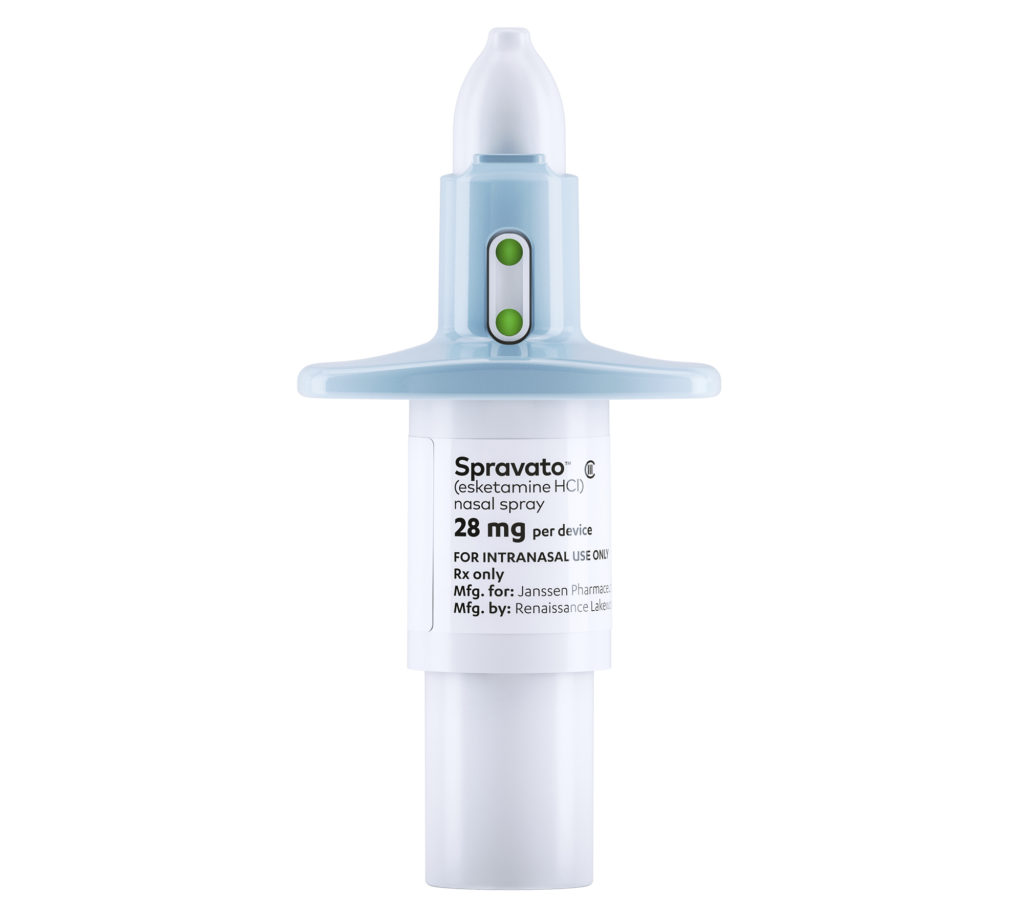
Tomorrow is the last day of 2019…and the day before a new year – and a new decade – begins.
Let’s jump in and look back. Let’s celebrate our progress over the last year and consider the impact of new breakthroughs this year. Some of these breakthroughs in psychiatry for 2019 may surprise you.
The World Health Organization says that depression is the leading cause of disability worldwide. (This is not a breakthrough–it’s one of the sad facts of our time.) And for at least 1/3 of those who suffer with it, traditional brand name and generic antidepressants on the market don’t work.
In the early 2000’s, researchers discovered that IV ketamine caused a rapid and robust response in people with major depression.
Now, 10 years later, a ketamine derivative is one of our biggest breakthroughs this year. So let’s talk about that, and other breakthroughs in psychiatry for 2019, as well.
Breakthroughs in Psychiatry for 2019
1. Esketamine (Spravato)

In March of this year, the FDA approved a derivative of ketamine, the left enantiomer of the molecule, in a specially designed nasal spray for treatment resistant depression under medical supervision in approved clinics. However, the FDA approved this to be used only in conjunction with another andtidepressant at the same tije.Use of esketamine requires the initiation of a new antidepressant at the same time.
After years of promising outcomes with IV and IM ketamine in treating depression and other disorders as an off-label treatment, FDA approval of esketamine presented a milestone — it’s a novel form of treatment as a nasal spray and it uses a derivative of a medication that we’ve been using successfully and safely for years. PTSD, cocaine use disorder, alcohol use disorder, bipolar depression, social anxiety, and suicidal thinking can all respond to IV ketamine.
While esketamine hasn’t been studied for most of these conditions, it can create a robust add-on response to an antidepressant in some patients who benefit from low doses. And the beauty of it is that because of its FDA approval, esketamine as a medication is covered by many insurance programs.
Although there are tons of hoops to jump through, red tape, paperwork, REMS monitoring (the risk mitigation program that the FDA requires that all doctors and patients participate in).
So… FDA approval marked a new breakthrough in psychiatry for 2019, and a milestone in ketamine’s journey. The quest for wider acceptance as a remarkable treatment for people who’ve remained depressed in spite of traditional medicines.
This 21st century novel and advanced treatment for psychiatric disorders is changing the face of disability.
Growing numbers of people are experiencing not only improvement, but remission from their symptoms, and are recovering to build fulfilling and rewarding lives, relationships, and futures.
Here at Innovative Psychiatry, we offer both IV ketamine treatment and esketamine nasal spray for those patients who are candidates for these treatments.
2. Telemental Health Support
Healthcare services provided by online video or telephone has been growing for a number of years. It has improved medical care for shut-ins and the elderly who have difficulty accessing it in the office. Psychiatric patients in remote areas have received better psychiatric coverage through this means of communication.
By combining technology with new policies, telemental health has advanced in its effectiveness again. Sometimes using a method of treatment reveals new opportunities for improvement as challenges reveal themselves.
So, The National Center for Performance Health in Florida recently established ecare4kids. This tele-counseling program serves public school children in Florida with online tele-counseling. All 50 states provide some amount of tele-health services through Medicaid.
Then in February 2019, Congress introduced the Mental Health Telemedicine Expansion Act. The Ways and Means Committe approved it in June of this year to ensure more psychiatric health care in remote areas throughout the US.
3. Gene-guided medicine
The Human Genome Project completed mapping the genome in 2003.
So what’s a genome?
Good question. It’s the complete set of DNA, or the genetic material, found in a microorganism or the cell of any living thing. In this case, we’re specifically talking about human DNA.
To clarify, DNA is made of a pair of twisting or spiraling strands that consist of four chemical units which we call nucleotide bases. And the bases are made of adenine (A), thymine (T), guanine (G), and cytosine (C). These bases are paired in specific patterns, i.e., an A is paired with a T, and a G is paired with a C.

Now imagine this: there are 3 billion of these base pairs in your DNA, which are held within 23 pairs of chromosomes…in the nucleus of every cell of your body.
You can see how ambitious it was for this team to take on the project of mapping all this out.
Well, now that we have that mapping, the obvious next step follows the reduction in price of mapping your own individual genome. The initial mapping project was estimated to cost 30 million dollars.
But the more they use this process, the more the process reduces in cost. The next steps can feasibly include things like getting your own map so your medical and health needs, and even the medicines you take, can be so specifically customized to your genetic profile as well as your environment and lifestyle, that the effectiveness of treatments you need can soar.
Which brings us to the point that the disorders we talk about and treat are, in most cases, inherited to some degree. So you see multiple family members suffering from psychiatric illnesses at the same time…and all too often — severe illnesses.
Imagine if we could better fit a medication or treatment specifically to your DNA profile. And the same for your family members. So much suffering from side effects could be eliminated.
We have important information already available to us about the cytochrome P450 enzyme system (the enzyme system in the liver responsible for the oxidative metabolism of many of our medications) …and at Innovative Psychiatry we use evidence-based genetic information as we have available to help explain your responses and guide your treatment.
4. Genetic Editing

…Say what?? It hasn’t been that long since we figured out what the genome looks like. Now we’re talking about editing it? Like editing a paper?
Well, sort of.
It turns out that this year genetic scientists broke through in a major way with a possible method for potentially removing genetic links to disorders and diseases like Alzheimer’s, ADHD, and autism, and replacing those links in the individual’s DNA with healthy links.
So…scientists at Harvard and MIT took the wraps off a new approach to what they coined, “prime editing.” The chemist/biologist who led the unveiling described its usefulness as a metaphor of Word processing.
A total WOW.
He said these little prime editors search for certain DNA sequences and precisely remove them, then replace them with sequences that don’t produce disease. He says that 89% of disease-causing defects can be resolved by this method…eventually.
Such astounding breakthroughs in psychiatry for 2019 – what can they imagine next?
The potential here goes without saying. What would happen if we would eventually do a little primed editing and edit out suffering? Like the kind associated with severe depression? With bipolar disorder? With alcohol dependence? With anxiety? We get breathless just thinking about it!
5. Psychiatric Healthcare with Cell Phones

A technical/data science/healthcare company (Mindstrong) has secured a handful of patents to develop an innovative method of providing mental healthcare services over cellphones.
By partnering with your health insurance company, services can be provided to you free of charge, including evaluations, psychotherapy, psychiatrist visits, medication evaluations, and support when things unexpectedly come up between doctor visits. Their psychiatrist will work with yours to provide smoother and continuing care. And because it’s designed to be free (for you), more people can receive care for their disorders.
Using a mobile app, text therapy can be provided as Cognitive Behavioral Therapy (CBT), Coping and Emotion Regulation, Psycho-education, Crisis Management, Reflective Listening, and Empathy.
Since 75% of Americans own a cell phone, finding a way to reach a broader audience with mental healthcare is evolving to naturally involve mobile phones. Hmmmm…..
Digital phenotyping collects data from the smartphone to provide measures of cognition and emotion. They say that the way you use your cell phone tells them a lot about your mood and state of mind. They can’t see you but they collect data.
They’re not covering every cellphone in the US yet, but they’re growing…and it won’t be long.
What do you think about this idea? I’d love to hear your comments below.
With all these psychiatry breakthroughs in 2019, it’s easy to get caught up in the sci-fi talk and forget what we have NOW.
We’re living in a new world, and IV ketamine treatment IS sci-fi.
We could not have imagined in the past century that a medicine originally designed for anesthesia would come out of the woodwork and actually provide a solution to major depression, alcohol overconsumption, opiate dependency, anxiety disorders, PTSD, OCD, bipolar depression, and suicidal inclinations. Ever.
Let’s not miss what’s right in front of us.
IV ketamine treatment can resolve depression symptoms.
This is the jarring news we take with us into the new decade.
Depression, PTSD, OCD, social anxiety, bipolar depression, substance use disorders, and suicidal thoughts no longer have to be a final sentence. You can get better. Your life can transform to a new, meaningful, rewarding source of joy…and hope.

If you wonder whether IV ketamine treatment could work for you, call us to schedule an appointment and come in. We invite contact from your health team, and we’d love to collaborate with them to help your life transform.
We look forward to the opportunities to meet you and discuss options in the new year.
Have a Happy and Healthy New Year in 2020 – full of hope, purpose, and joy.

To the restoration of your best self,

I have been disappointed by the conversations of patients that have used this new drug to treat MDD. The blogs of actual patients that are using esketamine have not been very favorable.
Any ideas to why? I had some much hope that maybe this would be the treatment that would once and all end my MDD. Now I do not have so much hope.
I’m sorry that I haven’t seen the blogs you’re referring to, but I’d be happy to take a look if you send me the links.